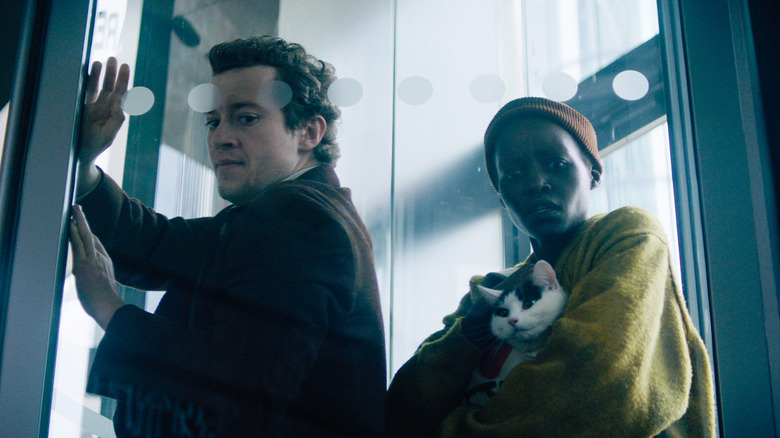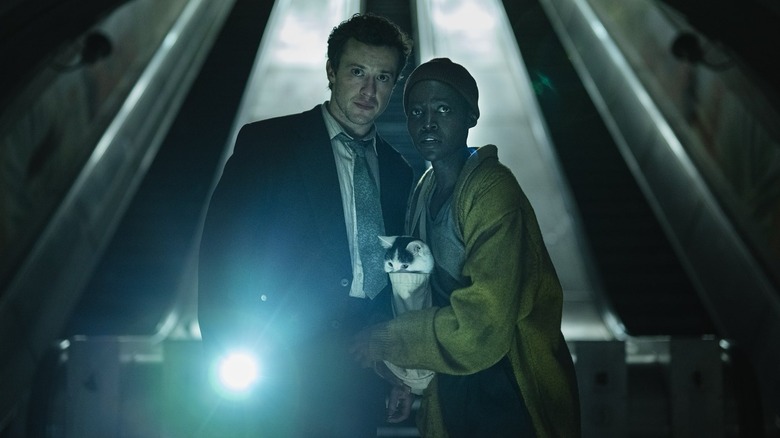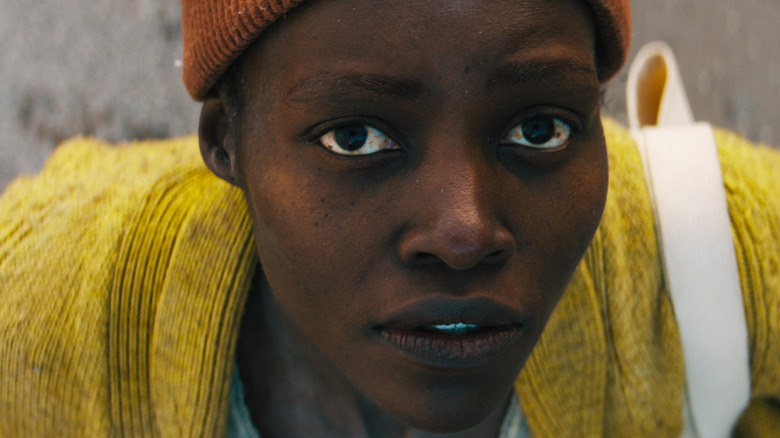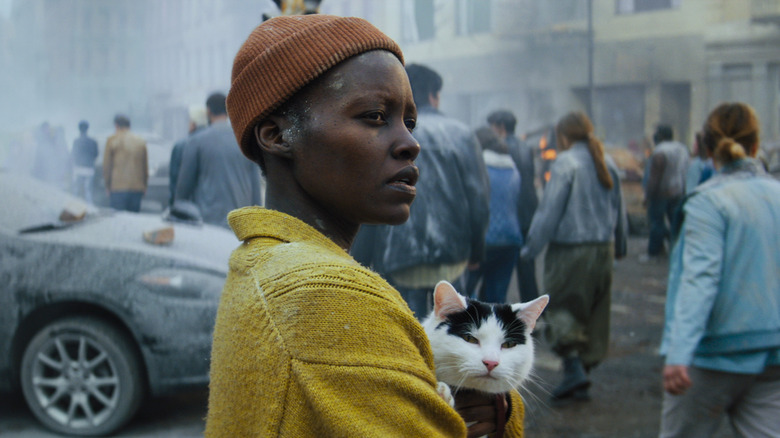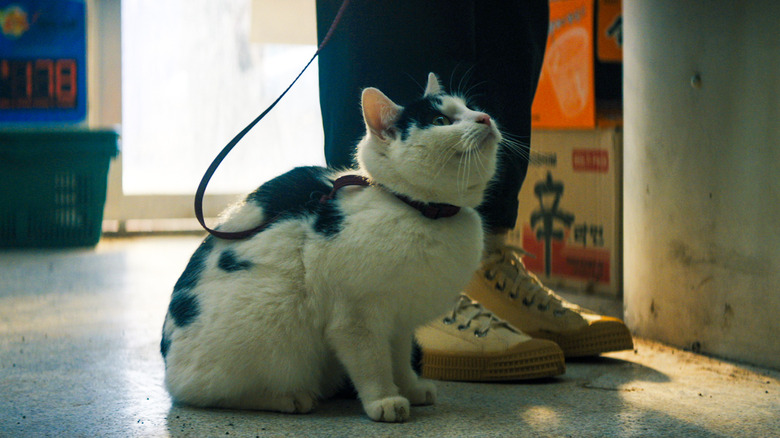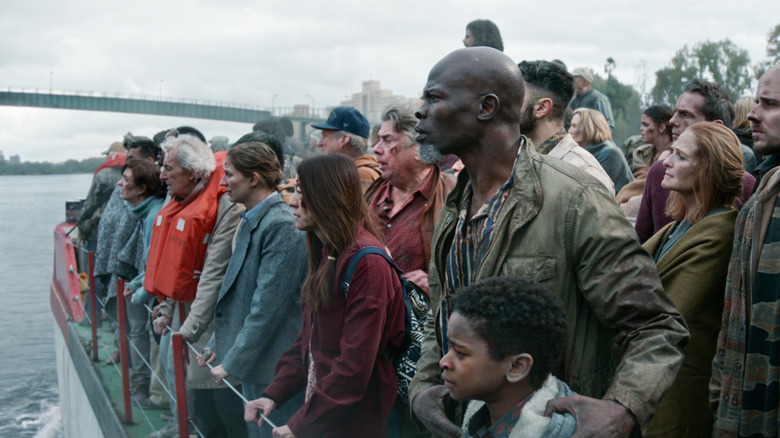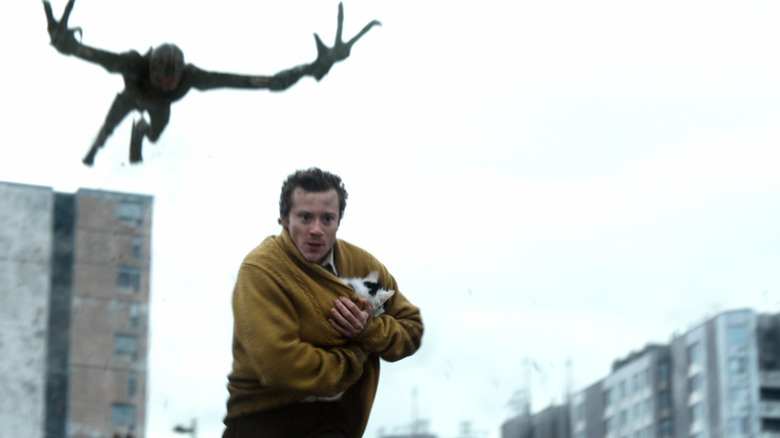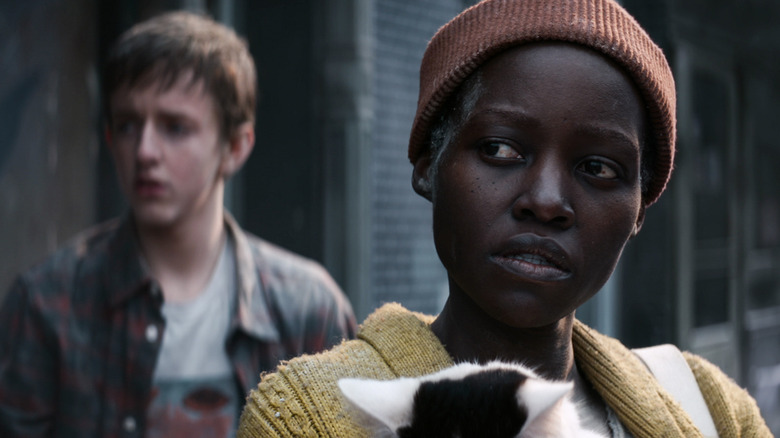A Quiet Place Prequel Director Bowed To Cat Actors: 'Mr. Cat, What Are You Willing To Give Us Today?' [Exclusive]
This post contains spoilers for "A Quiet Place: Day One."
There aren't a lot of franchises, especially horror franchises, that can boast a third installment as incredible as "A Quiet Place: Day One." The prequel story, which focuses on the day aliens arrived on Earth and began taking out humanity by hunting via sound, is being considered by many to be the best of the series thus far, thanks to stunning performances by Lupita Nyong'o and Joseph Quinn (and two very sweet cats named Nico and Schnitzel), a gut-wrenching script, and the brilliant directorial vision of Michael Sarnoski. For those unfamiliar with Sarnoski's work, the director's debut feature "Pig" is Nicolas Cage's best-reviewed live-action film and a gorgeous, meditative drama about why we care about others. "A Quiet Place: Day One" is a massive jump from the low-budget intimacy of "Pig," but Sarnoski never loses sight of what makes a movie great. There is no reliance on unmotivated set pieces or nonsensical explosions for the sake of it, instead electing to deliver a human story about trying to survive the end of the world — or ensuring that you go out on your own terms and no one else's.
I recently had the chance to talk to Sarnoski about his approach to what is looking to be the first box office horror hit of 2024, dissecting the emotionally charged themes and the sometimes absurdity of "directing" a cat. "Pig" made me a big fan of Sarnoski's work, but "A Quiet Place: Day One" solidified him as one of my favorite new voices in the genre space. The interview below is long, but well worth the read. If Sarnoski isn't already one of your new favorite directors, this should certainly do the trick.
Note: This interview has been lightly edited for clarity and brevity.
A Quiet Place films are character studies
How are you?
I am doing great. Yeah, I had a really ... the premiere was last night. It was a blast. Yeah, I'm good. How are you doing?
Doing well. My first question is not a question. It's more of a "how dare you," because I was a sobbing mess at The Grove last night because of this movie. So I just want to know where can I send my therapy bill to you?
Paramount. Yeah, Paramount's going to take care of all that. This is a legally binding statement.
Fantastic. Incredible.
Just kidding. That's not true.
So you were tasked with writing a prequel to an already extremely popular franchise, and that I think can be kind of an overwhelming ask for any creative. And I think there's probably this instinct for a lot of people of, "Okay, well, here's an origin story about these big-armed baddie aliens," and instead you took a very human approach. So I'm curious to know what your creative process was like even approaching this movie.
Yeah, so initially, John Krasinski came to me. He had seen my last movie, "Pig," and he really liked it and he kind of said, "What would it look like if you brought sort the 'Pig' touch to the 'Quiet Place' universe?" And he gave me a lot of space to figure out what that would mean to me. I think for me, that meant finding a character that was on an unexpected emotional journey and really focusing on that as the core of the film. The apocalypse monster stuff is there, but it's kind of happening around that core emotional story.
Also, I think especially if you go back to the first film, it's a very unique family drama about guilt and forgiveness, and at its core, I think what makes it great is that it's this beautiful character study. So I think doing justice to that tradition in the franchise while finding a very different character story to focus on was what excited me. That just sort of paired nicely with this world. I think there's something about these "Quiet Place" films where you're leaning in so much and so breathless because of the suspense that you're then able to do these kind of quiet character explorations. And without realizing it, you're leaning in and instead of jumping, you're crying. That was fun to play with.
Michael Sarnoski wanted to focus on the quiet moments
Oh, absolutely. I mean, on a personal note, when I was 23, I was diagnosed with pancreatic cancer and given a 5% chance to live.
Wow.
This past March was my 10-year, and so I'm still here. We love defying statistics.
Congratulations. That's amazing.
Oh, thank you. But this is all to say that this decision to have Lupita's character be somebody who is already living the end of the world when the literal end of the world happens, I thought was just very brilliant. So I would love to know how you really tapped into this character and this very specific feeling of having already accepted the end of the world, because, as evident by the puddle that some worker had to mop up at the end of my screening, you nailed it.
Oh, thank you so much. I mean, I think the idea of someone who already was dying appealed to me, because you can't go with any of the galactic horror movie tropes then. Like, if survival isn't even really the endgame, the whole, "Fight the monsters, escape the city," all of that stuff just kind of goes out the window. So I almost kind of wanted to kneecap myself a little bit that way where it's like, okay, if we can't do any of the easy stuff, let's really dive into this thing and let's find our meaning in this story through Sam. I just loved the idea of when suddenly the outward world becomes what she's been dealing with for her recent life, how does that sort of give her an opportunity to find new life and to find new connection and form a different relationship with her own death?
Focusing on the small moments and the small surprising connections felt very natural in that. And that lent itself well to this "Quiet Place" world. And that all just sort of unfolded really nicely. And then it just became about making sure every scene, even the big ones, were kind of about being focused on Sam's perspective and what she's going through and what she wants. I give credit to the audience. It was a risk. People can sit down and experience this. They can experience and put value into this and understand a less conventional narrative and a less conventional character and still really see the beauty and meaning in what she's going through. And they're willing to go there with her, which has been really nice. And yeah, I just kind of fell in love with Sam and just really wanted to see the end of the world through her eyes.
I love the choice to make it less of a story of survival and more of a story of dying on your own terms, especially in America. I think we have a really warped perspective with our own mortality and our own relationships with death. So this was so refreshing to watch.
Oh, thank you so much.
On embracing the unique relationship the world has with New York City
So I know that you are a Milwaukee boy. I grew up on the border of Illinois and Wisconsin, so I think you can probably understand when I say that for a lot of people who grew up in the Midwest, a city like New York is this idealized world that a lot of us learn about through movies. And yet in watching this, the person next to me, who is a New Yorker, was like, "God, this movie makes me really miss New York." So how do you approach having the city, which becomes a character itself, feel so lived in when it's not a place that you are fully lived in?
I mean, step one was research. When I first got the job, I rented an apartment in New York for a month and I just wandered around a lot. I read a lot of books about New York. I just tried to steep myself in it. And then the other thing I just tried to lean into was that I think even from the Midwest we all kind of have, somehow we have our own relationship with this city of New York. It has this kind of cultural significance. A lot of it I think has been through tragedy and things like 9/11, but New York sort of means something to everyone. And I think leaning into this idea of exploring characters that New York means something slightly different to all of them. Sam, this was her home and this was something she had to leave behind when she became ill, and she's seeing it again for the first time in a while.
For Eric, he's an immigrant who came to New York expecting things and expecting connection, and maybe not finding it. I think we all kind of put a lot of weight onto what New York City is. And it's almost like — I mean, for me, the movie is almost less about what those specific meanings are and more the fact that we put those meanings onto the city, and then what watching this meaning kind of crumble around us does to us. So it is just a very ripe setting to explore facing the reality of the world falling apart.
Absolutely. I'm glad that you brought up the connections we all have, because the second that we see Sam covered in the dust, I was immediately transported back to sixth grade watching the footage of 9/11 all over again. So it was very surreal to immediately be thrust back into that headspace. On a lighter note, though, was it a coincidence that both "Pig" and "A Quiet Place: Day One" both have food as such driving forces and heart to the plot? Or is that just your thing and should we expect more of these types of stories moving forward?
As a Midwestern boy, I love some good food. I mean, I think it's related to also why I love having animals in movies. I think there's something that I just find so relatable about when you point a camera at an animal or when you point a camera at an actor eating food, on a certain level, you know that you can't be lying. Like, the audience knows that's an animal and they're going to do what animals do. And we never used, like, a CG cat in this movie for that reason — you always want to feel like there's a reality to that which can't be faked. And it's the same with watching people eat. There's something that, I remember, even as a kid, I think it was in the "Ocean's Eleven" movie, when you're watching Brad Pitt just eat tons of food the whole time, and you're just like, "what is this feeling?" There's just something that you can't — that's just real. He's just eating a hamburger. You're always trying to sell reality in movies, but something about food and animals, you just don't second-guess it because there's something so fundamental about that.
Frodo the cat's actors dictated the production of A Quiet Place: Day One
Totally. And I mean, bless the evil algorithms that are coming for us all, but the second I got out of the movie and opened Instagram, it was like, "You might want to follow Schnitzel the Cat." And I'm like, "Damn right, I do." So I would love to hear about cat directing. I don't think people really think about what goes into having animals in a movie, especially one where there's so many things for this cat to jump around on, to get distracted by. But the same way that we wanted to give awards to the dog last year from "Anatomy of a Fall," I feel like these cats deserve some awards because there's some incredible animal acting. What's that like?
I agree. No, they were amazing. I mean, it's sort of like there's no such thing as cat directing. It's about, "Mr. Cat, what are you willing to give us today?" You surround yourself with incredibly talented animal trainers and these beautifully trained cats, and then you just kind of have to figure it out with them on the day a little bit. Sometimes they just nail exactly what you want. Sometimes it's like, "Oh, they don't want to do this thing. There's too many distractions. We have to simplify or we have to choose another direction." So it's kind of a fun discovery every day. And as you make the movie, as you go along, you kind of get to know a little bit more of like, "Oh, this is how the cat will respond in this situation. Let's tailor the scene this way a little bit so that we can really capture something authentic with the cat." So it's a lot of give and take and just feeling out the animals and then just having extremely talented trainers who get incredible stuff out of these cats.
Wonderful. And so I also want to talk a little bit about the character of Eric played by Joseph Quinn, who I think this is such a beautiful performance for him, especially for anybody who [recognizes him from his role as] Eddie on "Stranger Things." But you have Lupita as Sam, who is so determined and knows exactly where she's going, has already kind of mourned the world. And then you have Eric, who is this very scared puppy, essentially, following her around. I mean, he's a human, but this is sad animal tracking. So what was it like having to navigate both of those dynamics between these two characters, especially at the start, where those dynamics are much farther apart than the end when they become quite close?
Yeah. Step one is the script phase where you imagine how that progression is going to work, but then when it really is realized is when Lupita and Joe start kind of navigating each other and figuring each other out. And a lot of this movie is the two of them gradually seeing each other. There's a lot of shots of them just kind of processing each other and learning to empathize. And so, a lot of that is just sort of on the performance. But for me, that core, I like that idea of, for Sam, Eric almost invades her story. Even the way he comes into the movie is a little bit like, "What? This is my movie. What are you doing in my movie? I'm on my journey. I've decided what I'm going to do, leave me alone."
And then Eric is in this phase of he's so traumatized and confused that Sam sort of becomes this campfire in the darkness for him, and he puts too much emphasis on her and too much focus on needing her. And she's kind of like, "I can't be your campfire. I didn't sign up to mean anything to anyone at this point in my life." And I think it's kind of about both of them finding a little bit of a middle ground where Eric, you can't put that kind of focus on someone else, that kind of pressure on someone else, to be your campfire. You have to find that in your own soul. And then she also realizes that even though she thought she knew how she was going to round things out, she had to see someone else more fully for the first time in a while. I think that allowed her to connect with her own humanity and her own history. So, yeah, it was just sort of something that you hope for in the writing and you come up with these ideas that you think could resonate, and then you have incredible actors just realize it.
Yeah, they both are just absolutely phenomenal. I mean, I think we all know that the Academy fails to recognize the brilliance in genre film, especially acting, but they both are two of the best performances I've seen this year.
Thank you very much.
A Quiet Place could have future stories
We know what happens to many of the people on the boat because of "A Quiet Place Part II." Is there any interest in pursuing what happens with Eric moving forward, or are you happy with where his story has ended?
I mean, I definitely approached this story as a contained [experience]. You could watch this without having seen any of the other "Quiet Place" movies, without ever seeing any other one, and you can appreciate this for what it is. I definitely think that there is a strong possibility that he could be on that island and he could be in the later films. And I haven't had any chats about that yet and there's nothing official, but I think there's a lot of characters in this universe that are really wonderful and fun to explore, and I'm sure they'll come up with some very cool ways to bring them back.
Amazing. So looking towards the actual monster side, because we've talked a lot about the very human side. Something that I was really struck by is that shot of the globe with sticky notes on it. Is there anything that I should be looking out for when I go and see this again or when this is on Blu-ray and I go frame by frame like a psycho? Is there anything on that globe, or was that just beautiful set dressing?
We were definitely pretty specific about it. I don't think we're trying to seed anything [in particular]. "Oh, wait for 'A Quiet Place Denver.'" That's not really what we were going for. But I mean, we were definitely kind of trying to communicate that, and it's alluded to in the second "Quiet Place," they mentioned that Shanghai had been hit. But we wanted to make it clear that there's hotspots all around the world.
And I kind of like the idea that, I remember looking at one of the loudest cities in the world that, logically, creatures would kind of coalesce in a lot of these loudest cities in the world and these urban centers. And I think you see, there are probably things like what's happening in New York happening all around the world. But no, there's nothing, not like, a crazy ... I think hopefully, for whoever does the next "Quiet Place" movie, it'll be the same thing that John's stuff was for me, which was I studied those first two "Quiet Place" movies and tried to look at all the little details and nuances and figure out which things I wanted to borrow and expand upon. So yeah, if someone sees it and decides they want to do "Quiet Place Rio," then they can have at it.
Oh, definitely. I always think about one of my favorite movies as a kid was "Independence Day" because it was the craziest thing I had ever seen as a kid. And you get those shots of the ships burning in different cities around the world. And I don't know, it really lets your mind understand the scope of something that's happening. So the globe did that for me in this movie.
Oh, that's great to hear.
Michael Sarnoski explains the weirdest part of A Quiet Place: Day One – that egg scene
In talking about the things that you wanted to borrow or expand upon, did you have to talk with John Krasinski about any of the lore expansion? This is also kind of the most up close and personal look we're really getting in some of these creatures, and there's the weird egg thing. What's up with the weird egg feeding? It's gross and cool, but what is it?
Yeah, I mean, I would suggest things in the script and there wasn't some Bible of like, "Here's how the creatures work and you've got to do this stuff." Everyone was kind of open to new ideas. I think a big thing with these creatures was finding that balance of you don't want to over-explain them. Part of what's so fun about them is that they're very alien and we don't fully understand them. So I wanted to hint at a couple things. I mean, for me, the egg thing, and it's very not made a focus — I didn't want to make that scene like, "Hey, here's what's going on," and that's important because it's not important to Eric at that time. He's just trying to save Frodo and you're just kind of getting a hint that there's an ecosystem of these creatures around him.
But yeah, for me, what I was getting at with that was you can see all these sort of pools of this pink, glassy liquid, and if you look closely, you can see that there's bodies in those pools. And the idea is that in the other movies, you kind of get that the creatures take people, and they never really say what they're doing with them. And I think everyone's just like, "Oh, they're eating the people or something." But I like the idea that the creatures are kind of leafcutter ants that are sort of farming, using the organic material of people to grow what is their food source, which is these kind of weird melon-y, egg, mushroom things that they sort of feed the little ones with. So it just kind of is hinting at, at the end of the day, these are farmers and they have a little bit of a family dynamic to them. I liked that idea, especially coming off the first "Quiet Place" that's about a rural farming family. So yeah, that was kind of what I was hinting at without making too fine a point of it.
That's such a clever approach, because the second I got out, I was like, "Well, I have to go see this again when it comes to theaters, specifically because I want to hyper-analyze that scene." So now I have a little bit of jumping off point to check out.
'You always have to be keeping that rollercoaster ride going'
These aliens, though, they're so scary. Anything with limbs that are a little too long immediately give me the ick in ways that I don't like. So when you're coming up with the scares or these big set piece moments, where does that come along in the process for you? Because the human stuff is so dialed in, and then this movie reminds you, "Oh, don't forget, there are giant aliens that are going to wipe you out if you don't shut up." So where do these set pieces come in? Do they come organically in the script, or is it like, "All right, we've had X amount of pages of heartfelt emotional stuff, let's blow up a building?"
Yeah, I mean, it's a little bit of both. You want all of these moments to feel rooted in character, perceived through the lens of character and to be playing a role in this character's journey. But yeah, it's a little bit of everything. I think the things I was always thinking about was one, how do we piece this out so that there feels like there's a build to how we're interacting with these creatures? So at first we're dealing with shadows and little pieces, and then by the end, you can have two dozen creatures chasing our main characters. And how we escalate that gradually was a big thing that we were always keeping in mind. One thing I think is really powerful about these creatures is that kind of uncanny valley thing where it's like if you look at them in the right way for a second, you almost think it's a person.
The first time we see a creature, you see this silhouette that sort of just looks like a person standing up. And then suddenly, the head opens up and the arms come out and it's like, "Oh, what the heck is that?" I think there's something fun to play with there. And there's a moment where the creature first finds Reuben and its head comes into frame and it sort of just feels like this weird, faceless, flat thing, and then it opens up. I think playing with kind of that uncanny nature of the creatures is fun, and then kind of escalating it into the herd dynamic side of it was exciting to me. This idea that there's so many of these creatures and they are just thundering through the city. And if there's a sound going by of a helicopter, you're about to get a herd of a thousand creatures running by.
Thinking of how all those things could sort of play out, you start piecing those things together and then the logical extensions of them come about. Like, when helicopters are coming by to deliver the order to evacuate, that's important that you hear the evacuation order. But then that also presents a threat because we've learned that when helicopters go by, there's going to be a herd of creatures and you need to hide from it. So some of it just sort of evolves naturally in that way from the things that are specific and interesting about the creatures.
And then, yeah, you're always thinking about the pace of the movie overall. If you were just always at a 10 of intensity, it would start feeling monotonous. And if you were always in sort the quiet, emotional space, it would start feeling monotonous. You always have to be keeping that rollercoaster ride going up and down and balancing those things.
Totally. I have time for one last question for you. So if it's your end of the world, what is your Patsy's Pizza? What is the thing that you are going after because you've got to, before everything comes to the end?
I mean, it wouldn't work as well for mine because you kind of need someone to be making it, but I would do sushi. I love some sushi. But I don't know, maybe there's an omakase chef still going at it. But yeah, I love me some sushi.
"A Quiet Place: Day One" is in theaters now.
